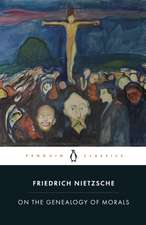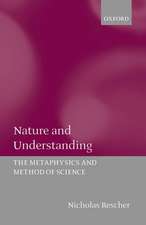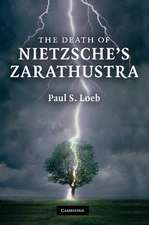On Leibniz: Expanded Edition
Autor Nicholas Rescheren Limba Engleză Paperback – 27 iun 2013
Contemporary philosopher John Searle has characterized Gottfried Wilhelm Leibniz (1646–1716) as “the most intelligent human being who has ever lived.” The German philosopher, mathematician, and logician invented calculus (independently of Sir Isaac Newton), topology, determinants, binary arithmetic, symbolic logic, rational mechanics, and much more. His metaphysics bequeathed a set of problems and approaches that have influenced the course of Western philosophy from Kant in the eighteenth century until the present day.
On Leibniz examines many aspects of Leibniz’s work and life. This expanded edition adds new chapters that explore Leibniz’s revolutionary deciphering machine; his theoretical interest in cryptography and its ties to algebra; his thoughts on eternal recurrence theory; his rebuttal of the thesis of improvability in the world and cosmos; and an overview of American scholarship on Leibniz.
Other chapters reveal Leibniz as a substantial contributor to theories of knowledge. Discussions of his epistemology and methodology, its relationship to John Maynard Keynes and Talmudic scholarship, broaden the traditional view of Leibniz. Rescher also views Leibniz’s scholarly development and professional career in historical context. As a “philosopher courtier” to the Hanoverian court, Leibniz was associated with the leading intellectuals and politicians of his era, including Spinoza, Huygens, Newton, Queen Sophie Charlotte, and Tsar Peter the Great.
Rescher extrapolates the fundamentals of Leibniz’s ontology: the theory of possible worlds, the world’s contingency, space-time frameworks, and intermonadic relationships. In conclusion, Rescher positions Leibniz as a philosophical role model for today’s scholars. He argues that many current problems can be effectively addressed with principles of process philosophy inspired by Leibniz’s system of monadology.
On Leibniz examines many aspects of Leibniz’s work and life. This expanded edition adds new chapters that explore Leibniz’s revolutionary deciphering machine; his theoretical interest in cryptography and its ties to algebra; his thoughts on eternal recurrence theory; his rebuttal of the thesis of improvability in the world and cosmos; and an overview of American scholarship on Leibniz.
Other chapters reveal Leibniz as a substantial contributor to theories of knowledge. Discussions of his epistemology and methodology, its relationship to John Maynard Keynes and Talmudic scholarship, broaden the traditional view of Leibniz. Rescher also views Leibniz’s scholarly development and professional career in historical context. As a “philosopher courtier” to the Hanoverian court, Leibniz was associated with the leading intellectuals and politicians of his era, including Spinoza, Huygens, Newton, Queen Sophie Charlotte, and Tsar Peter the Great.
Rescher extrapolates the fundamentals of Leibniz’s ontology: the theory of possible worlds, the world’s contingency, space-time frameworks, and intermonadic relationships. In conclusion, Rescher positions Leibniz as a philosophical role model for today’s scholars. He argues that many current problems can be effectively addressed with principles of process philosophy inspired by Leibniz’s system of monadology.
Preț: 422.13 lei
Nou
Puncte Express: 633
Preț estimativ în valută:
80.80€ • 84.21$ • 67.26£
80.80€ • 84.21$ • 67.26£
Carte tipărită la comandă
Livrare economică 06-20 ianuarie 25
Preluare comenzi: 021 569.72.76
Specificații
ISBN-13: 9780822962182
ISBN-10: 0822962187
Pagini: 416
Dimensiuni: 152 x 229 x 30 mm
Greutate: 0.73 kg
Ediția:Mărită
Editura: University of Pittsburgh Press
Colecția University of Pittsburgh Press
ISBN-10: 0822962187
Pagini: 416
Dimensiuni: 152 x 229 x 30 mm
Greutate: 0.73 kg
Ediția:Mărită
Editura: University of Pittsburgh Press
Colecția University of Pittsburgh Press
Recenzii
“Besides the value of his historical research and his interpretive proposals, Rescher can be credited for having shed light not only on the motives that, albeit in a different theoretical framework, speak in favour of a Leibnizian style in philosophy but also on some of the
elements of Leibniz’s metaphysics relevant to our metaphysical problems.”
—Studia Leibnitiana on the original edition
elements of Leibniz’s metaphysics relevant to our metaphysical problems.”
—Studia Leibnitiana on the original edition
“This collection of Rescher’s work . . . is an invaluable record of his contributions to our
understandings of Leibniz’ thought in the last quarter century.”
—Philosophy in Review on the original edition
understandings of Leibniz’ thought in the last quarter century.”
—Philosophy in Review on the original edition
“With this extraordinary collection we are reminded of Rescher’s philosophical roots and his inspiration. The topics covered help reveal both Leibniz’s interests and times and the
enormous value of the rigor of Rescher’s scholarship.”
—Joseph C. Pitt, Virginia Tech, on the original edition
enormous value of the rigor of Rescher’s scholarship.”
—Joseph C. Pitt, Virginia Tech, on the original edition
Notă biografică
Nicholas Rescher is Distinguished University Professor of Philosophy at the University of Pittsburgh and co-chairman of the Center for Philosophy of Science. A member of the American Academy of Arts and Sciences, he has served as president of the Eastern Division of the American Philosophical Association, the Leibniz Society of North America, the Charles S. Peirce Society, the American Catholic Philosophical Association, and the Metaphysical Society of America. Rescher is the author or editor of more than one hundred books, including Ignorance (On the Wider Implications of Deficient Knowledge), Philosophical Inquiries: An Introduction to Problems of Philosophy, and A Journey through Philosophy in 101 Anecdotes.
Descriere
On Leibniz examines many aspects of Leibniz’s work and life. This expanded edition adds new chapters that explore Leibniz’s revolutionary deciphering machine; his theoretical interest in cryptography and its ties to algebra; his thoughts on eternal recurrence theory; his rebuttal of the thesis of improvability in the world and cosmos; and an overview of American scholarship on Leibniz.
Other chapters discuss his epistemology and methodology, its relationship to John Maynard Keynes and Talmudic scholarship. Rescher also views Leibniz’s scholarly development and professional career in historical context. He extrapolates the fundamentals of Leibniz’s ontology: the theory of possible worlds, the world’s contingency, space-time frameworks, and intermonadic relationships. In conclusion, Rescher positions Leibniz as a philosophical role model for today’s scholars.
Other chapters discuss his epistemology and methodology, its relationship to John Maynard Keynes and Talmudic scholarship. Rescher also views Leibniz’s scholarly development and professional career in historical context. He extrapolates the fundamentals of Leibniz’s ontology: the theory of possible worlds, the world’s contingency, space-time frameworks, and intermonadic relationships. In conclusion, Rescher positions Leibniz as a philosophical role model for today’s scholars.















